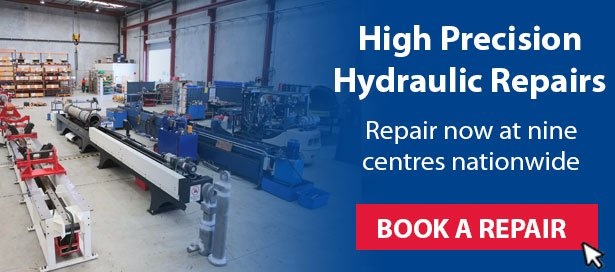Are your cylinders trying to tell you something? There are several warning signs of serious hydraulic cylinder wear that give you advanced warning that a cylinder is on its way out. Learning to recognise these telltale signs will help you to treat common problems before they become catastrophic failures. That way, you can conduct planned hydraulic cylinder repair and avoid costly unplanned stoppages, or worse. So, here are six signs that all is not well with your hydraulic cylinders. Ignore these at your own risk.
1. You start hearing alarming banging noises.
Hydraulic cylinders shouldn’t sound like jackhammers. Unpleasant banging or knocking noises are usually caused by air in the hydraulic fluid or cavitation. Air bubbles in the system undergo extreme compression and decompression. Cavitation is a related phenomenon that happens when there’s not enough fluid getting to any part of a hydraulic circuit. When this occurs, the pressure drops so low that the fluid essentially vaporizes. When the pressure returns, this cavity of fluid implodes in on itself with a nasty knocking noise. In either case, stop what you are doing to avoid damaging the machine. Cavitation and aeration cause fluid contamination and damage to system components through loss of lubrication, overheating and burning of seals.
2. Your hydraulic cylinder starts “juddering”.
Any loss of smooth, consistent movement is a bad sign. This is known as “slip-stick” or “juddering”, where the cylinder becomes hesitant or the movement becomes stilted or jerky as the cylinder extends. This is often accompanied by an increased drawdown of power and an increase in heat of the cylinder. Juddering is usually a sign of increased friction, possibly caused by worn seals, insufficient lubrication or something serious like a bent piston rod.
3. Your power bill goes up.
If your energy requirements have increased, your cylinders might be part of the problem. Increased friction and internal or external leakage overcome these effects, the other parts of the system must work harder. Hydraulic pumps must deliver more fluid to overcome leakage, hydraulic motors work harder and torque per kw numbers become less efficient.
4. The actuator starts to slow down.
A loss of power or general slowing of cylinder operation indicates that something is not right and is probably a sign that there is some kind of internal leakage or increased friction. When leakage occurs it means the hydraulic cylinder takes longer to build the required pressure. Sometimes operators turn up the power in order to overcome the loss of performance, but this only serves to mask the problem. If the underlying leak or damage is not repaired, the cylinder will continue to decline in performance until it becomes totally inoperable. Increasing power to compensate for poor performance only serves to hasten the inevitable failure of the cylinder.
5. Your cylinder starts getting way too hot.
While certain hydraulic cylinders do experience increases in temperature during operation, these are usually within prescribed limits outlined by the manufacturer. In certain high speed or high peak load situations, some cylinders may experience temperatures as high as 120 degrees, but usually, cylinders should not exceed 80degrees during normal operation. An unusual rise in temperature could be symptomatic of abnormal conditions within the cylinder. So it is a good idea to be aware of the general operating temperature of your cylinders.
6. You notice the piston rod is wearing on one side.
A cylinder is a linear actuator, which means it should run in a straight line. If a rod shows signs of increased wear on one side it is an indication of abnormal function such misalignment, excessive lateral loading, a bent rod or some form of internal wear or damage. If left untreated, it is likely to lead to a loss of power, efficiency and eventual failure.
Hydraulic cylinders rarely fail without warning. In most cases, these hardworking components drop a few hints that all is not well. Learning to pick up on these clues is a vital part of staying on top of proactive maintenance that can be conducted in an orderly and non-disruptive manner. So be aware of what your cylinders are trying to tell you.








Leave A Comment